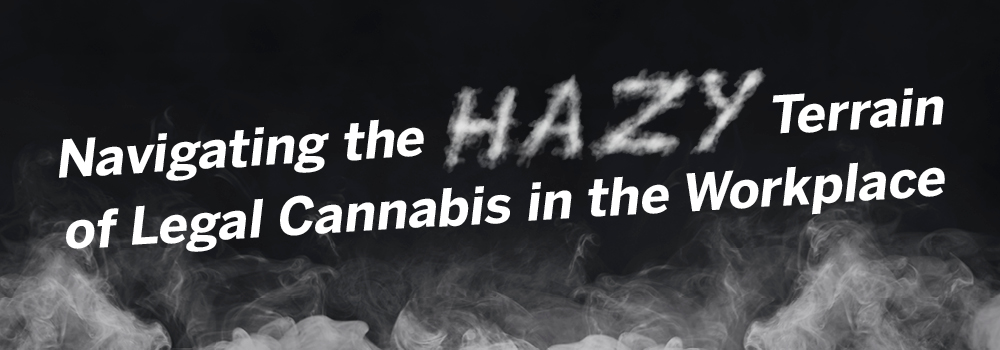
By Charles Goldstein
What if your employer client contacted you for advice on how to deal with an employee who was found ingesting cannabis in the company parking lot? What if the employer had decided to penalize the employee through withholding his due wages (clearly, a violation of wage theft laws)? Now think about receiving a telephone call from a client who has been an employee of a company for more than 25 years, who has been operating safety equipment and has concerns related to drug testing, which may reveal his current or even long-term use of cannabis. He does not believe that his use impacts his performance, but he is a daily user of cannabis and recently was cited for a careless collision with substantial and valuable merchandise.
Both of these are cases that our office has encountered in just the past month. Nearly all attorneys will face cannabis-related situations in years to come, so it’s best to begin our familiarizing ourselves now. These situations both point to the need for all employment lawyers—plaintiffs' and the attorney advising businesses—to understand how the new laws impact rights to use cannabis in connection with the workplace, including inevitable concerns related to employees possessing and/or utilizing cannabis or related products at company events. The legal questions may also relate to usage on company premises outside of work and possibly outside of working hours. Each of these scenarios present multilayered concerns for the employer and the employee alike.
This article addresses a variety of concerns relating to the possession, use, and display of cannabis and related products by employees (including prospective employees) among other issues reflecting an ever-evolving landscape relating to cannabis and the workplace. It’s a brave new world, but one that we’re in!
The New Legislation
The recently passed statute expanding legal cannabis use defines “lawful consumable products” as products “whose use or enjoyment is lawful and which are consumed during use or enjoyment,” including “food, alcoholic or nonalcoholic beverages, and tobacco.”1 Cannabis is now a lawful consumable product under state law.
Medical cannabis has been legal in some form and use in Minnesota since 2014, although the program was highly restrictive. The new legislation greatly expands the forms medical cannabis can legally take, including flower, concentrates, and edibles. The legislation does not add new prescribable conditions for cannabis, however it does permit the Office of Cannabis Management to add conditions to the list.2
Regulation of Cannabis
Medical cannabis will be regulated by the Office of Medical Cannabis under the Department of Health until at least March 1, 2025. The medical program will be controlled by the Division of Medical Cannabis under the Office of Cannabis Management.
Minnesotans now have a plethora of options for obtaining cannabis, THC, and related substances—including the local dispensary or microbrewery, etc. to engage in consumption. Business and employment law attorneys must take heed: What are the implications for employers and employees and those who counsel them on relevant legal issues relating to cannabis and the workplace? Though there is some case law on the topic, it is limited, and statutory interpretations and applications have yet to bear out some needed clarifications.
Social Media and Online Image
Query whether employers may restrict displays of logos or company-related information associated with an individual's use or endorsement of cannabis. In particular, social media, though an open forum, is a reasonable concern for the employer and their reputation (just as alcohol as a mood-altering substance could create unfavorable impressions to potential and actual customers). Certainly, an employer has the right to somewhat control their online image as portrayed by employees, at least by influencing the employees through the employee handbook and workplace policies.
At the same time, what of the employee who speaks of cannabis as a medication he or she has been prescribed? This can occur in a variety of social media venues such as chat forums. Such communication being productive and constituting useful social discourse should not be discouraged by antiquated stereotypes of cannabis. What if the employee makes no indication that they work for their particular employer in the course of those discussions? Is a reprimand or direction appropriate and non-discriminatory? Or is it neither?
An individual consuming cannabis at home is not legally or factually implicated in assumptions that he or she will engage in particular conduct at work. A marijuana user is not necessarily lackadaisical, threatening or otherwise inappropriate in the work environment. Such stigma related conceptions must be set aside or these could result in a discrimination claim based upon the underlying medical condition of the user who has been prescribed cannabis for that condition.
Areas of Use
The employer (and employee) should be aware of the perimeters relating to the areas of use allowed by the legislation. The areas in which cannabis products can be legally used are significantly more restricted than where they can be possessed. The law allows adult cannabis use3 at a venue or event licensed for such uses. As with tobacco, smoking or vaping cannabis products is prohibited in locations covered by the Minnesota Indoor Clean Air Act (MICAA), which the Minnesota Department of Health notes includes private social clubs.4
Underlying Conditions/Discrimination Against Cannabis Users
The Lawful Consumable Products Act (LCPA) prohibits an employer from refusing to hire, disciplining, or discharging an employee because “the applicant or employee engages in or has engaged in the use or enjoyment of lawful consumable products” if they do so out of the workplace and during non-working hours.5 The statute excepts bona fide occupational requirements “reasonably related to employment activities or responsibilities of a particular employee or group of employees….” 6 Employers may also restrict employee consumption of lawful consumable products if a restriction is necessary to avoid an actual or perceived conflict of interest with any responsibilities owed by the employee to the employer.7
Employers who comply with statutory requirements regarding policies, notice, and testing protocols can lawfully require drug and alcohol testing for job applicants and employees in certain circumstances: routine physicals, random selection, reasonable suspicion for drug or alcohol impairment, or after an employee returns from a chemical dependency treatment program.9
Other Considerations
There are many other considerations which may be implicated from the declassification of cannabis and related products as illegal drugs.
Contractual
Taking into account an employee handbook and other actual or quasi contractual provisions, consider contractual considerations when a potential or present employee seeks to have a contractual provision which addresses allowance of usage of cannabis to manage his or her symptoms of anxiety. Formerly, such a contract incorporating agreements to utilize what had been an illegal drug and would potentially facilitate an illegal transaction and thus be contractually void. This will no longer be the case.
The new law does not require employers to accommodate for cannabis use or possession while working, operating machinery or equipment, or while on the premises, including but not limited to if failure to discharge or discipline an employee over cannabis use would violate federal or state law or regulations or cause an employer to lose a monetary or licensing-related benefit under federal law or regulation.9 Employers are well advised to prohibit these activities in written policies to make clear to employees that not every situation will require that the employer accommodate use or possession of cannabis on the job when use would violate the law or regulations or cause the employer to lose of monetary or licensing-related benefits. It would seem that the employee can justifiably request accommodation for medical marijuana use and possession unless one of the above statutory criteria is met.
Discrimination
Merely because an individual is consuming cannabis in connection to employment does not legally or factually implicate them in threatening conduct. Such stigma related conceptions must be set aside. The danger is that individuals may be classified behaviorally in a way that does not reflect reality, due to misperceptions by employers and other employees.
Relative to discrimination, the employer must beware that physicals and other procedures should not be required in a manner which reflects stereotypes of cannabis users, and rather be based upon reasonable suspicion of impairment. ‘Profiling’ of cannabis users could become a prominent topic in workplace legal conflicts in situations in which cannabis users believe they are being singled out for adverse treatment.
Insurance Coverage
Insurance law may also see the effects of cannabis in the workplace relative to claims that an assault or other negative behavior such as lack of attentiveness may have been a result of intoxication with cannabis. The negligence aspect of insurance law may be complicated by what could be claimed to be the purposeful nature of cannabis intoxication. The historical literary association between recklessness and cannabis use (e.g. Reefer Madness) could influence insurance coverage decisions relating to employees and managers.
These areas of intersection are certainly not exhaustive, but merely a few of the areas of concern that may be impacted.
Conclusion
The history and new legislation related to cannabis provides a fascinating, complex, danger ridden landscape for the employer, while at the same time, provides helpful accommodation to employees. Balancing these interests will be the key to enforcing the intent of this developing field of law.
Further Reading:
Given the complexity of this area (even separate from testing issue), the following is a query for electronic research which will help guide your way in analyzing the related and complex topics: controlled substance or marijuana or marihuana or canna! or hemp! or thc or cbd or edible/15 work! or employ! or office or job and not test! 129 cases are revealed which are jurisdictionally relevant to Minnesota.
DISCLAIMER: This article does not cover issues related to home usage, criminal law implication (including expungement related to cannabis and other substances), nor those related to possession and use of firearms relative to these substances, free speech issues, medical ailments qualifying or not qualifying as medicinal use under the legislation, or business licensing implications. These exclusions are due to the space restrictions of this article.

Charles Goldstein is an Employment Law attorney. He began practicing in this area in 1991 and is a vigorous but collaborative attorney for both plaintiffs and businesses. He is located in the North Loop of downtown Minneapolis and represents clients throughout the metropolitan area and outstate Minnesota. His practice is Advocate at Work. AdvocateAtWork.com.
Notes